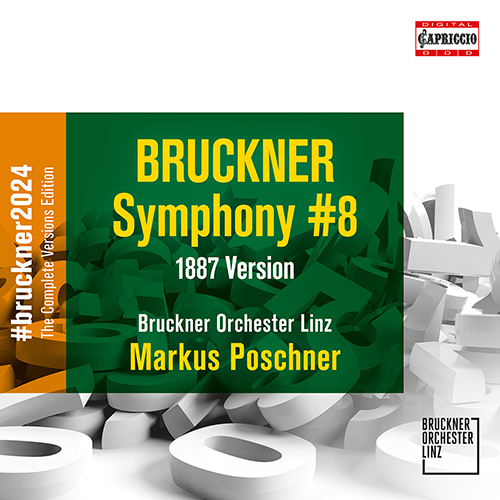BRUCKNER, A.: Symphony No. 8 (original 1887 version, ed. P. Hawkshaw) (Complete Symphony Versions Edition, Vol. 7) (M. Poschner)
Tracklist
Poschner, Markus (Conductor)
Poschner, Markus (Conductor)
Poschner, Markus (Conductor)
Poschner, Markus (Conductor)
Poschner, Markus (Conductor)
The Bruckner Orchester Linz, which looks back upon more than 200 years of history and tradition and officially adopted its current name in 1967, has developed into one of the leading orchestras in central Europe during recent decades. The members of BOL constitute not only the symphony orchestra of the state of upper Austria, but also the featured orchestra for musical productions at the State Theatre in Linz. Its home is the Musiktheater building, opened in 2013, one of the most modern theatre buildings in Europe. The orchestra presents concerts at the International Bruckner Festival in Linz, concert cycles at the Brucknerhaus, and the ‘Grand Concert Night’ at the Ars Electronica Festival.
As an ambassador of upper Austria and of its namesake, the BOL appears regularly on international stages. During recent years it toured the USA, Japan and numerous European countries. During its history, the orchestra has been led by guest conductors such as Clemens Krauss, Hans Knappertsbusch, Sergiu Celibidache, Kurt Eichhorn, Václav Neumann and Christoph von Dohnányi, and more recently by Zubin Mehta, Serge Baudo, Horst Stein, Vladimir Fedoseyev, Michael Gielen, Bernhard Klee, Steven Sloane, Stanislaw Skrowaczewksi, Michael Schønwandt and Franz Welser-Möst; its style was shaped by chief conductors such as Theodor Guschlbauer, Manfred Mayrhofer, Martin Sieghart and Dennis Russell Davies.
Since Markus Poschner became its chief conductor in the autumn of 2017, this orchestra has been undergoing an unprecedented process of opening toward the outside, generating many new concert formats, seeking out unexpected performance places, finding surprising pathways in education, and first and foremost offering artistic events which meet with high resonance from audience and press due to their immediacy and intensity. Markus Poschner and the BOL are exploring their very own version of the music of the orchestra’s namesake, rendering it in an unmistakable, upper Austrian musical dialect, most recently manifested in a benchmark recording of the Eighth Symphony. Since 2012 the Bruckner Orchester Linz has had its own concert cycle at Vienna’s Musikverein; from 2020, this was joined by another cycle at the Brucknerhaus in Linz. The BOL was honoured with the “Best Orchestra of the Year” award at the 2020 Austrian Musical Theatre Awards.

Since joining the Bruckner Orchestra Linz in 2017 Markus Poschner has garnered much international acclaim for his new and exciting approach to music-making – his Bruckner interpretations are a shining example of this. In 2020 the orchestra and conductor were respectively named Austrian Orchestra and Conductor of the Year. Since winning the German Conductors’ Award in 2004, Poschner has made guest appearances with numerous internationally renowned orchestras, including the Staatskapelle Dresden, Staatskapelle Berlin, Bamberger Symphoniker, Munchner Philharmoniker, Dresdner Philharmonie, Konzerthausorchester Berlin, Rundfunk-Sinfonieorchester Berlin, ORF Vienna Radio Symphony Orchestra, Wiener Symphoniker, Orchestre Philharmonique de Radio France, Nederlands Philharmonisch Orkest and NHK Symphony Orchestra Tokyo. He has also worked at the state opera houses of Berlin, Vienna, Hamburg and Stuttgart, and opera houses in Frankfurt and Zurich.
In 2018, Poschner won a prestigious International Classical Music Award (ICMA) for his recording of the complete Brahms symphonies for Sony Classical with the Orchestra della Svizzera italiana, with whom he has served as chief conductor since 2015. More recently, his recording of Offenbach’s Maître Péronilla with the Orchestre National de France won the 2021 German Record Critics’ Award.
Having studied at the conservatory in Munich and served as an assistant of Sir Roger Norrington and Sir Colin Davis, Poschner became first Kapellmeister at Komische Oper Berlin in 2006. From 2007 until 2017 he was the general music director of the Bremer Philharmoniker. He was appointed honorary professor by the University of Bremen in July 2010, and by the Anton Bruckner Private University in Linz in 2020. Poschner conducted the Bayreuth Festival Orchestra for the first time in 2019 in a guest performance of Richard Wagner’s Die Walküre in Abu Dhabi. In July 2022, he opened the Bayreuth Festival with Tristan und Isolde, conducting the same production at the 2023 festival.
RELATED ARTICLES:
Bruckner’s 200th anniversary: Interview with Markus Poschner on Symphony No. 3 (Gramophone)

Anton Bruckner, born near Linz in 1824, is known chiefly as a symphonist. He trained as a schoolteacher and organist, serving in the second capacity in Linz until moving in 1868 to Vienna to teach harmony, counterpoint and organ at the Vienna Conservatory. His success as a composer was varied in his lifetime, his acceptance hampered by his own diffidence and his scores posing editorial problems because of his readiness to revise what he had written. He was nine years the senior of Brahms, who outlived him by six months. Bruckner continued Austro-German symphonic traditions on a massive scale, his techniques of composition influenced to some extent by his skill as an organist and consequently in formal improvisation.
Orchestral Music
Bruckner completed nine numbered symphonies (10 if the so-called Symphony No 0, ‘Die Nullte’, is included). The best known is probably Symphony No 7, first performed in Leipzig in 1884; the work includes in its scoring four Wagner tubas, instruments that were a newly developed cross between the French horn and tuba. Symphony No 4, ‘Romantic’, has an added programme—a diffident afterthought. All the symphonies, however, form an important element in late-19th-century symphonic repertoire.
Choral Music
Bruckner wrote a number of works for church use, both large and small scale. Among the former are Te Deum, completed in 1884, and various settings of the Mass, including the well-known Mass No 2 in E minor.































